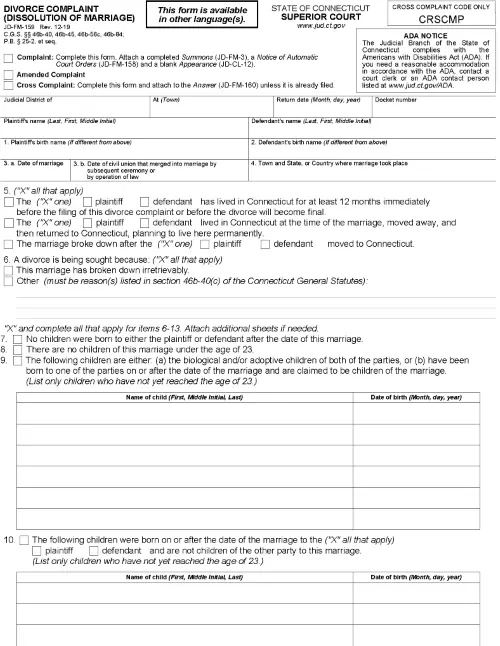You are allowed to file for divorce in Connecticut once either party has established residence in the state. However, the divorce will not be granted until one spouse has lived in Connecticut for 12 months. In other words you can file for divorce the day you establish residence but it will not be granted for at least a year.
Example of a Connecticut Divorce Paper

You may also filed for divorce in Connecticut if either spouse resided in Connecticut at the time of the marriage and returned to Connecticut with the intention of living there permanently before filing for divorce.
Connecticut Divorce Papers
Divorce With Minor Children
To initiate a divorce with minor children in Connecticut, you will need the following forms:
- Connecticut Divorce Complaint
- Connecticut Summons Family Actions
- Connecticut Notice of Automatic Court Orders
- Connecticut Affidavit Concerning Children
- Connecticut Motion For Orders Before Judgment (if you want temporary orders issued)
Once you complete the forms, the documents must be sent or brought to the Superior Court Clerk’s Office for the Clerk to sign the summons. After doing so, the Clerk will return the forms to you. Copies of the paperwork must be delivered to your spouse by a State Marshal. The Clerk’s office or the Court Service Center can give you a list of State Marshals. A State Marshal will charge a fee for delivering the paperwork which you must pay, unless the court has decided that you do not have to pay.
Divorce Without Minor Children
To initiate a divorce without minor children in Connecticut, you will need the following forms:
- Connecticut Divorce Complaint
- Connecticut Summons Family Actions
- Connecticut Notice of Automatic Court Orders
- Connecticut Motion For Orders Before Judgment (if you want temporary orders issued)
Once you complete the forms, the documents must be sent or brought to the Superior Court Clerk’s Office for the Clerk to sign the summons. After doing so, the Clerk will return the forms to you. Copies of the paperwork must be delivered to your spouse by a State Marshal. The Clerk’s office or the Court Service Center can give you a list of State Marshals. A State Marshal will charge a fee for delivering the paperwork which you must pay, unless the court has decided that you do not have to pay.